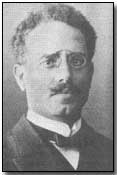Who's Who - Karl Liebknecht
 Karl Liebknecht (1871-1919)
was a leading German revolutionary at the close of the First World War.
Karl Liebknecht (1871-1919)
was a leading German revolutionary at the close of the First World War.
Born in Leipzig on 13 August 1871, Liebknecht's father - Wilhelm - was a leading German socialist. During his law and political economy studies at Leipzig and Berlin Liebknecht himself developed Marxist views.
Before starting work as a lawyer Liebknecht served with the Imperial Pioneer Guards from 1893-94. Moving to Berlin in 1898 his political activities increased; he took to defending people charged with political crimes and himself later spent 18 months in prison in 1907-08. He joined the Social Democratic Party (SPD) in 1900 and married the same year (his wife died in 1911).
In 1901 Liebknecht was elected to serve on Berlin's town council, a position he retained until 1913. In 1912 he was elected to the Reichstag with the SPD. Two years later he and a number of others on the left of the party, including Rosa Luxemburg, came out against German participation in the First World War. Together they formed the Spartacus League and the underground Spartacus League newspaper in which to publicise their views.
Liebknecht was soon arguing in favour of a revolutionary uprising, a stance which led to his arrest and conscription into the army in February 1915; he served on the Eastern Front burying the German dead until ill-health brought his return home in October 1915.
In April 1916 Liebknecht caused outrage by voting against war credits, an act which led to his expulsion - the first - from the Reichstag. Undaunted by the uproar caused by this act and continuing to campaign against the war's continuation, Liebknecht was shortly afterwards arrested and sentenced to four-and-a-half years in prison for sedition.
With the collapse of the German government in October 1918 Liebknecht was granted political amnesty by Max von Baden. Together with other Spartacists Liebknecht campaigned openly for revolution, forming the German Communist Party at the end of December 1918.
An abortive revolutionary uprising in Berlin on 6 January 1919 was rapidly quashed by the Friedrich Ebert-backed Freikorps and Liebknecht and others were imprisoned. Nine days later he was executed without trial while in captivity.
A sandbag was a sack filled with earth from which defences were built.
- Did you know?
